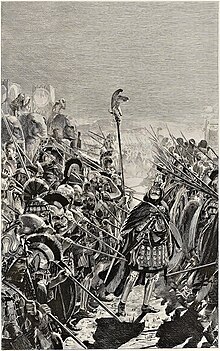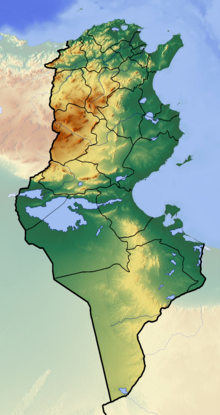| Battle of Utica | |||||||
|---|---|---|---|---|---|---|---|
| Part of the Mercenary War | |||||||
 Hanno leads his army against the rebels, as envisaged by Georges Rochegrosse and Eugène-André Champollion | |||||||
| |||||||
| Belligerents | |||||||
| Carthage | Rebels | ||||||
| Commanders and leaders | |||||||
| Hanno the Great | Uncertain: probably Spendius | ||||||
| Strength | |||||||
|
8,000–10,000 men 100 war elephants | 10,000 | ||||||
| Casualties and losses | |||||||
| Unknown | Unknown | ||||||
Location within Tunisia | |||||||
The Battle of Utica took place early in 240 BC between a Carthaginian army commanded by Hanno and a force of rebellious mutineers possibly led by Spendius. It was the first major engagement of the Mercenary War between Carthage and the combined forces of mutinous ex-Carthaginian troops and rebellious African cities which broke out in the wake of the First Punic War. Both sides were routed during the course of the battle, which ended with the rebels occupying the field but was strategically inconclusive.
The rebel army, some 10,000 strong, was blockading the city of Utica when the Carthaginian army of 8,000–10,000 men and 100 elephants stormed their camp and routed them. Satisfied with their victory, the Carthaginians failed to pursue and dispersed to loot, forage and celebrate. The rebels regrouped, returned, attacked the Carthaginians who were occupying their old camp and routed them in turn. The Carthaginians were also not effectively pursued and regrouped to continue the campaign. The bitter war which followed ended in 238 BC with a Carthaginian victory.

